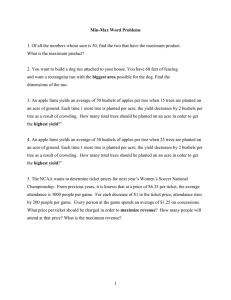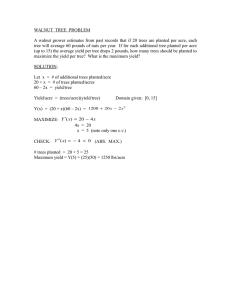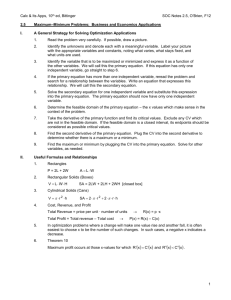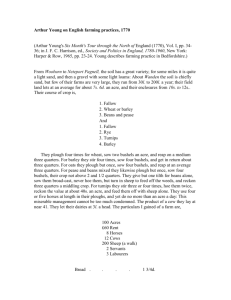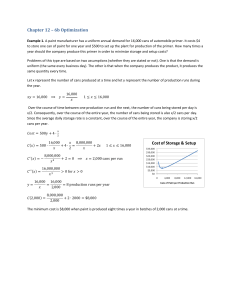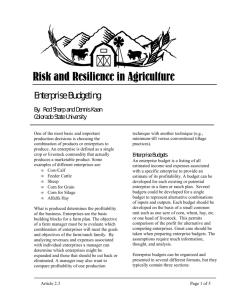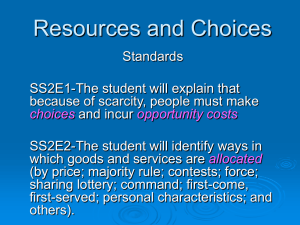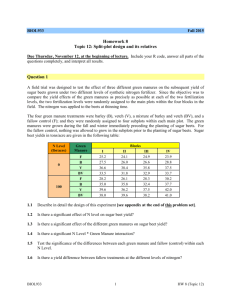x - YCP.edu
advertisement
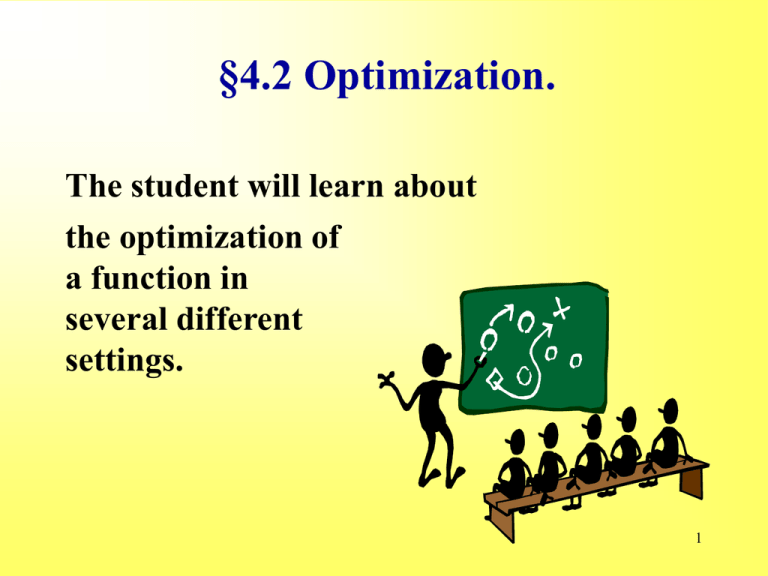
§4.2 Optimization. The student will learn about the optimization of a function in several different settings. 1 Reminder of Facts f is increasing f ‘ (x) > 0 f is decreasing f ‘ (x) < 0 f is constant f ‘ (x) = 0 f is concave up f “ (x) > 0 f concave down f “ (x) < 0 Inflection point f “ (x) = 0 2 Example 1 Find the max and min values of f (x) = x3 – 12 x f ’ (x) = 3x 2 - 12 so that the critical values are +2, -2. Test at – 2 and 2, the critical values. f (- 2) = 16 a max. f ( 2) = - 16 a min. I’m using my calculat 3 Example 1 Continued Find the intervals where the graph of f is concave upward, the intervals where the graph of f is concave downward if f (x) = x3 – 12 x. f ‘ (x) = 3x2 - 12 f “ (x) = 6x f “ (x) is positive when x > 0 so f is concave up on the region (0, ∞) f ” (x) is negative when x < 0 so f it is concave down on the region (∞, 0). Check with your calculator. 4 Example 1 Continued Find the inflection points of f (x) = x3 – 12 x. f ‘ (x) = 3x2 - 12 f “ (x) = 6x f “ (x) is zero when x = 0 so there is an inflection point at (0, 0). 5 A new problem is coming up. Clear your heads of the old one. 6 Another Optimization Example A peach grower finds that if he plants 40 trees per acre, each tree will yield 60 bushels of peaches. He also estimates that for each additional tree that he plants per acre, the yield will decrease by 2 bushels. How many trees per acre should he plant? What should we let x equal? Let x be the number of additional trees per acre. The number of trees per acre t (x) = 40 + x. The yield per tree y (x) = 60 - 2x. The total yield Y (x) = (40 + x) (60 - 2x) = 2400 – 20x – 2x 2 7 Another Example - Continued P. 216, #6. A peach grower finds that if he plants 40 trees per acre, each tree will yield 60 bushels of peaches. He also estimates that for each additional tree that he plants per acre, the yield will decrease by 2 bushels. How many trees per acre should he plant? The total yield Y (x) = (40 + x) (60 - 2x) = 2400 – 20x – 2x 2 Maximize Y with your calculator x = - 5 [35 trees/acre] and a yield of y = 2450 bushels. - 30 ≤ x ≤ 30 0 ≤ y ≤ 2600 8 A new problem is coming up. Clear your heads of the old one. 9 Maximizing Volume Suppose you have a 9“ by 12” piece of construction paper. If you cut a square out of each corner and fold the sides up you will have a box that is open at the top. What size square should be cut out in order to maximize the volume of the box? Let x be the side of the square cut out of the corner. What is the volume formula? x V = lwh Notice that this is four variable and we may only have two and x and a V. What should we do? 10 Continued Maximizing Volume Suppose you have a 9“ by 12” piece of construction paper. If you cut a square out of each corner and fold the sides up you will have a box that is open at the top. What size square should be cut out in order to maximize the volume of the box? V = lwh l = 12 – 2x and w = 9 – 2x and h = l. x V = (12 – 2x)(9 – 2x)(x) = 108x - 42x 2 + 4x 3 . We will now set the first derivative equal to zero and solve. V ‘ = 108 – 84x + 12x 2 = 12 ( 9 – 7x + x 2) 11 Continued Maximizing Volume Suppose you have a 9“ by 12” piece of construction paper. If you cut a square out of each corner and fold the sides up you will have a box that is open at the top. What size square should be cut out in order to maximize the volume of the box? V ‘ = 108 – 84x + 12x 2 = 12 ( 9 – 7x + x 2) x Using the quad formula or your calculator yields x = 5.30 and x = 1.70. Notice that the first solution is not possible. Why? 12 Summary. • We did an optimization problem using a cubic function. • We optimized a peach harvest. • We optimized a volume. 13 ASSIGNMENT §4.2; Page 76; 1 – 19. 14
